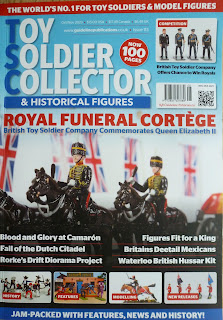I don't normally buy Toy Soldier Collector magazine, because it mostly seems to be about reviewing new product, but flicking through the latest issue I noticed two articles of interest.
The first was a three page tribute to John Ruddle, who sadly passed away in February, written by James Opie, with photographs taken by Paul Cattermole. John will be well known to most people who visit these pages due to his internationally renowned model garden, which has featured in numerous wargame publications down the decades. I didn't know John well but he only lived about a mile away from me and kindly invited me over to visit on a couple of occasions. He was a great character with an unbridled passion for the hobby, both collecting and wargaming with Britains 54mm hollow cast lead toy soldiers.
So much so that he had landscaped his garden to represent different continents complete with buildings built from concrete in the relevant styles of architecture. The beds on the left represented Europe, with areas allocated to England, France, Germany and Italy, also a small area for Belgium which included the Mons canal. The large lawn in the centre of the garden represented ocean, and John had made fleets of battleships which he'd cut out of aluminium sheet so that the wouldn't rust because they were left out all year round.
If I remember correctly the end of the garden had a large rockery with a hill fort and village to represent the North West Frontier and Africa. There were two ponds which fed streams representing rivers and the canal mentioned above, that ran through the countries. There was also an O gauge railway, originally clockwork, John told me that when he had his house rewired the electrician was so taken with the garden he offered to electrify the railway, he installed a transformer and built a control panel for John to operate it.
On one occasion John was in the process of building a palace with harem for a Turkish Sultan, to be situated on a point between Africa and Europe. He had laid out a square wooden frame on the ground and filled it with sand, into which he would make an imprint of the building facade, and then pour in concrete. He explained that on some of his earlier buildings he'd had a problem with cracks in the concrete due to frost until a builder doing some work on his house advised him to add sugar to the mix to prevent this. A lot of the buildings had removeable roofs so that figures could be stored inside them, nothing vintage but ones that he cast himself, and each year he would give their paintwork a touch up, he also had to spring clean the buildings because mice would nest in them over the winter!
The last time I met John was at the London Toy Soldier Show where Paul Morehead and I interviewed him about his memories of Major Henry Harris, but that's another story for another day. He was also selling off part of his collection so I bought several units of German and Russian cavalry from him, he was very pleased that they would continue to serve in games on the table and in the garden.
Which leads me neatly on to the second article of interest and this is two pages written by Paul Holcroft Wright about the new edition of Funny Little Wars, a reworking of the original layout with all new illustrations and incorporating a lot more background to H.G. Wells. I know that several other bloggers who visit here are fellow members of the FLW group and will already have the new edition but I couldn't pass up the opportunity to give it a mention.














